10 Ways how to stop gambling addiction
Table of content
- 1. Plan ahead of time to prevent boredom
- 2. Take each day as it comes
- 3. Try something absolutely new
- 4. Restore an old hobby
- 5. Be extra cautious in the days leading up to potential gambling occasions
- 6. Find techniques to cope with stress more effectively
- 7. Remind yourself that gambling means losing
- 8. Determine your self-sabotage triggers
- 9. Imagine your betting company or casino with a terrible slogan
- 10. Make a gratitude list every day
- What is gambling?
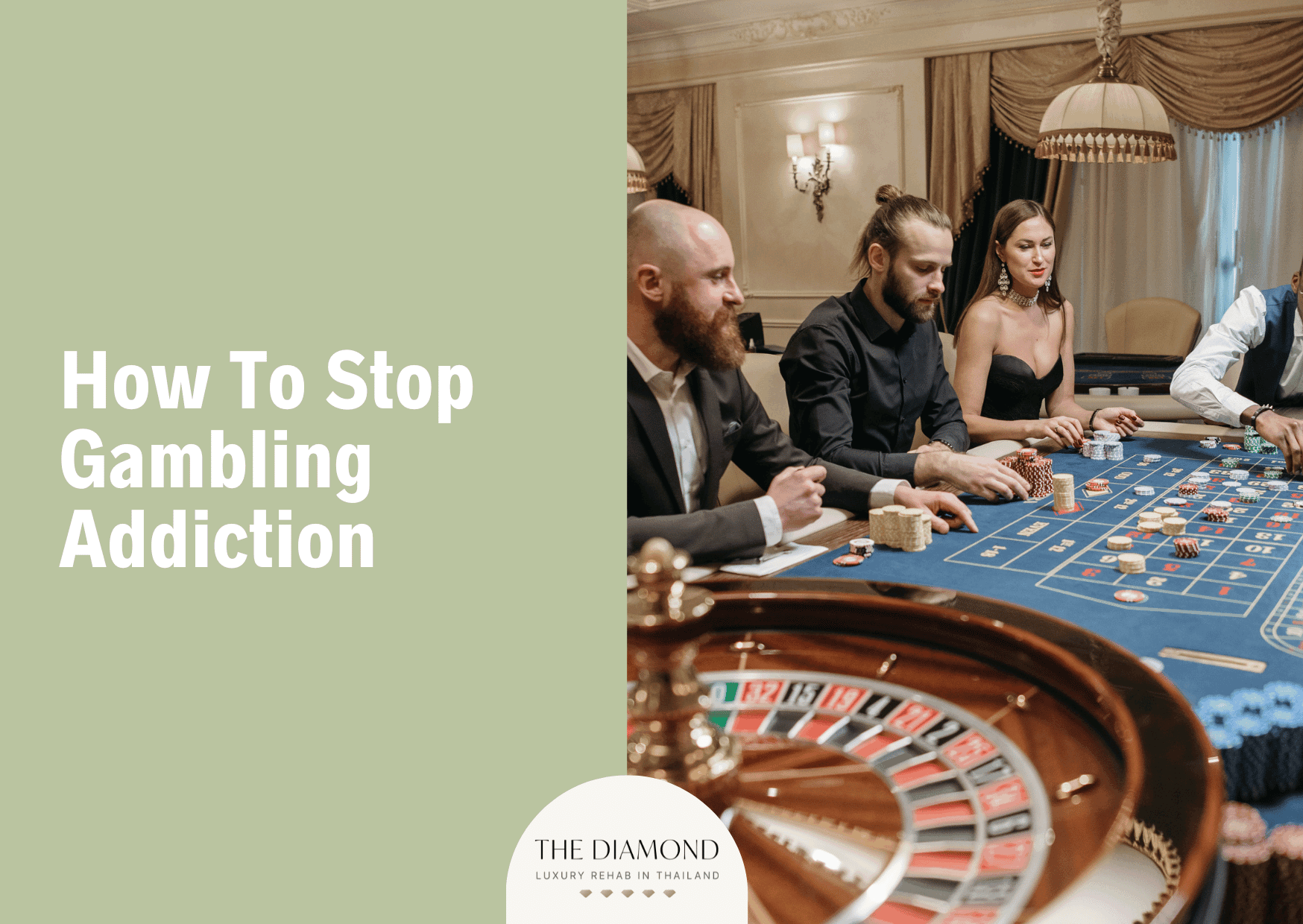
Gambling is defined as the act of betting or wagering money or other items of value on an event with uncertain results with the purpose of winning more money (or items of value). Taking part in any activity where a person uses money, hoping to win more, is considered gambling. It’s not just betting on sports teams; it additionally involves horse racing, casino, card games, pool, and lotteries.
Although it seems fun and exciting, gambling does more harm than good. The main reason to stop gambling is that it leads to pathological gambling and gambling addiction. Consequences of gambling addiction are numerous, including financial difficulties, relationship issues, legal troubles, work-related problems, increased risk of suicidal thoughts and tendencies, and it affects the overall health of a person. Gambling addiction is a serious problem, but it is possible to stop it with a well-structured treatment program. The best ways to stop gambling addiction are listed below.
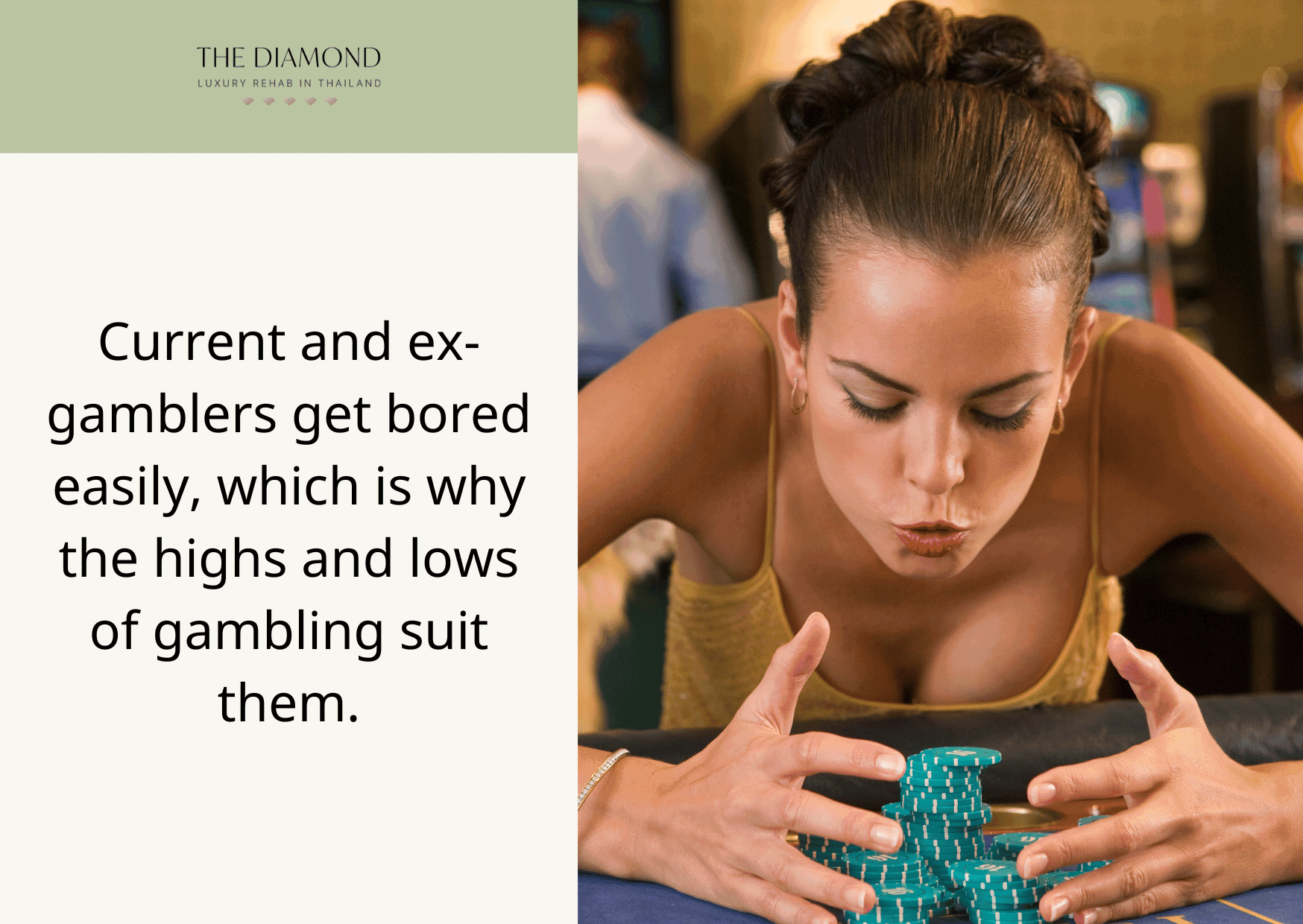
1. Plan ahead of time to prevent boredom
Planning ahead of time to prevent boredom highlights the need to take proactive steps to reduce the likelihood of giving in to the temptation of gambling activities. This idea suggests that people must organize their schedules and tasks ahead of time so that they have productive and interesting things to do throughout any boredom episodes.
Current and ex-gamblers get bored easily, which is why the highs and lows of gambling suit them.
How to prevent moments of boredom? Planning is the key. Use weekends as an opportunity to make plans for the upcoming week. A well-structured plan primarily consists of a thorough list of things to be done every day.
For example, get up at a specific time, get ready to work, head to the gym, meet friends, or finish errands. The main point here is to build a mental picture that shows there’s something to do every day. Otherwise, finishing work (or school) creates an illusion of having a lot of free time on your hands, which leads to gambling.
Use a planner to make plans for every day. People who don’t like actual planners make do with digital ones (such as Notes on their phones, apps, and calendars on their desktops). Writing the plan down makes it “official,” and people are more likely to stick to it.
Evidence shows writing plans and goals down is a powerful tool in changing behavior. Vividly describing goals is strongly linked to success in achieving them, a 2018 article written by Mark Murphy for Forbes reported. In this case, a thorough and detailed plan leads to greater adherence. This translates to reduced boredom and a lower risk of gambling.
This particular tip works for people who want to recover from gambling addiction and persons who have already recovered but want to reduce the risk of relapse.
2. Take each day as it comes
Taking each day as it comes implies adopting a mindful and present-oriented approach to one’s daily life. This viewpoint urges people to let go of the tendency to worry about the future and instead concentrate on the here and now, seizing opportunities and challenges as they present themselves.
This advice additionally means waking up and recommitting to the process of addiction recovery every single day. Despite stressful circumstances and regardless of what happened the day before, a person needs to make a conscious decision to carry on. This is the best way to stop gambling.
To do this, it’s useful to practice mindfulness. Mindfulness means focusing one’s awareness on the present. Use mindfulness to concentrate on every day without allowing bad moments from the day before to tear you down. At the same time, try not to focus on the day after.
Other things that help take each day as it comes include keeping a journal, setting achievable daily goals, and stopping worrying about “what ifs.”
Taking it one day at a time works by lowering the stress that persons with gambling addiction experience. A common problem for most people with gambling addiction is that they get overwhelmed thinking about avoiding anything gamble-related for the rest of their lives, which they believe to be impossible. At times, this stress becomes so intense that it leads to cravings, after which a person starts gambling again. This method is all about taking it easy in order to protect mental health and strengthen one’s decision to quit gambling.
3. Try something absolutely new
Trying something absolutely new suggests the exploration of alternative and constructive activities as a means of diverting attention away from gambling behaviors. This concept encourages individuals to seek novel experiences that replace or supplement the thrill associated with gambling.
This strategy is particularly useful for persons who started gambling because they were seeking excitement. Options for trying something new include signing up for a class (unrelated to a person’s profession), going to a new restaurant, traveling to new places, planting a garden, and engaging in other fun activities you’ve never tried before.
It works because it gives much-needed excitement to thrill-seekers. The Journal of Gambling Studies published a comparative study in 2008 by Pantalon et al., that found that excitement-seeking is associated with large gambling gains and losses, incarceration, any substance misuse or dependence, excessive and varied gambling, and signs of compulsive gambling (i.e., at-risk gambling). Everything about gambling is uncertain, which makes it even more exciting for certain people. Since the majority of people engage in gambling just to feel that rush, the excitement it provides mainly serves as the reason behind relapse. Doing something new gives you that excitement and thereby reduces the need for gambling.

4. Restore an old hobby
Restoring an old hobby entails going back to pursuits and interests that formerly fulfilled a person. This idea highlights the need to reestablish healthy and constructive hobbies as a tactic to discourage people from participating in gambling activities.
Individuals with gambling addiction lose interest in activities they used to enjoy. In fact, losing interest in hobbies and other activities is one of the biggest symptoms of gambling addiction. While working on recovery, restoring an old hobby is incredibly helpful.
Restoring an old hobby makes a significant impact. Think about activities and hobbies that brought joy before gambling addiction. What are they? Write down a couple of them and firmly decide to take up that hobby again.
Returning to an old hobby works because it allows a person with gambling addiction to replace unhealthy habits with healthy or positive behavior. A hobby additionally acts as a distraction that helps reduce the intensity of cravings for gambling.
Moreover, restoring an old hobby helps people stop gambling because it reduces endorphins i.e., feel-good chemicals. A 2009 study by Pressman et al., published in the journal Psychosomatic Medicine found that hobbies and other leisure activities improve physical and psychological health and well-being.
Engaging in hobbies releases serotonin, dopamine, and other neurotransmitters that improve mood. For that reason, restoring an old hobby gives dopamine and serotonin a boost without gambling. As a result, it becomes easier for a person to live their life without gambling or other risky activities.
5. Be extra cautious in the days leading up to potential gambling occasions
Being extra cautious in the days leading up to potential gambling occasions underscores the significance of increased awareness and taking preventative action before circumstances that cause gambling behavior.
This encourages individuals to exercise vigilance and self-monitoring during the days preceding events or circumstances where the risk of engaging in gambling activities is heightened.
Certain events tend to be challenging for a person with gambling disorder. That’s why it’s important to be extra careful during this day and the days leading up to it.
The events depend on the type of gambling. For example, a sports gambler needs to be careful and reduce exposure to sports-related content during tournaments and important games.
If they are exposed to sports content on social media primarily, it is useful to stop using those apps until the tournament or game is over. Try uninstalling the app and installing it afterward. Or don’t watch channels that hype up sports content. That way, a person isn’t tempted to gamble. This method to stop gambling works by avoiding temptation. Occasions such as sports events trigger cravings for gambling. A careful approach to these events and reducing exposure minimizes cravings and thereby supports recovery or reduces the risk of relapse.
6. Find techniques to cope with stress more effectively
Finding techniques to cope with stress more effectively is a necessary step in learning more efficient coping mechanisms. It is acknowledged under this viewpoint that stress is a major cause for compulsive behaviors such as gambling.
In addition, stress plays a major role in gambling addiction relapse. That’s why it’s necessary to find a way to handle stress more effectively.
The main objective is to find something relaxing or engaging in activities that reduce stress. Once you find them, try practicing them regularly or using them as go-to measures whenever you are stressed out or frustrated.
Stress management techniques include meditation, yoga, reading and/or writing, taking long walks every day, starting a hobby, self-care, exercise, hanging out, and deep breathing. The best thing to do is to try several techniques to find the most effective approach.
Stress management for stopping gambling addiction works because it prevents a person from engaging in this activity to deal with stress more effectively. A 2020 paper by Wang et al., from the journal Addictive Behaviors revealed that there is a strong connection between gambling problems and stressful life events.People who gamble to cope are more susceptible to experiencing serious gambling problems. In fact, stress predicts the onset of problematic gambling. That’s why finding a way to manage stress reduces the likelihood of gambling and minimizes cravings for such behavior.
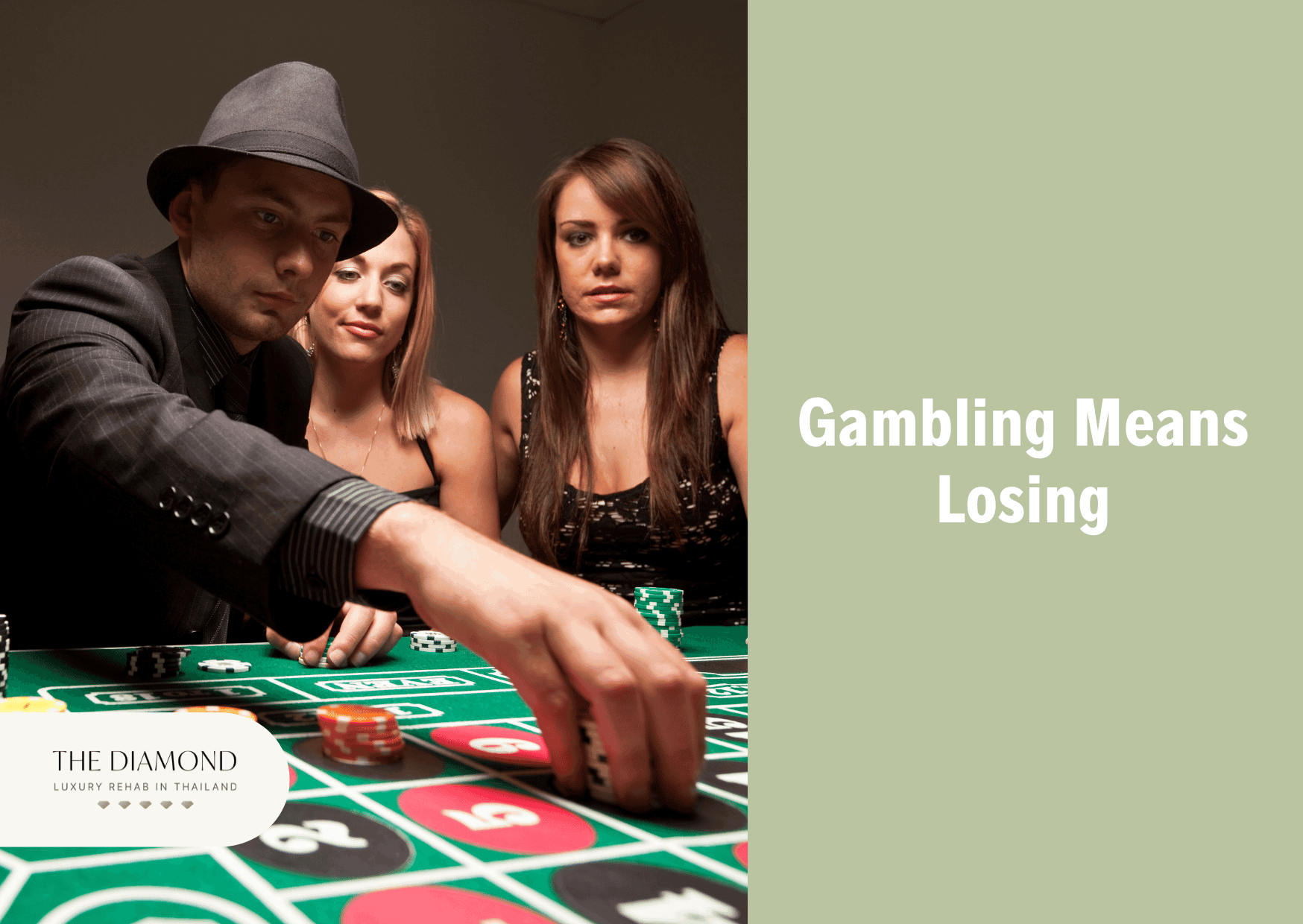
7. Remind yourself that gambling means losing
Reminding yourself that gambling means losing emphasizes how crucial it is to keep an accurate understanding of the risks that are inherently connected to gambling. This concept encourages individuals to consciously acknowledge that, in the long run, the odds are typically stacked against them in most forms of gambling.
Start by writing this concept down. Write the phrase on a piece of paper, such as a post-it note, and keep it in a visible place.
Even better, use several post-it notes and have the phrase attached in several places, including a computer, desk, coffee table, or anywhere else. It’s useful to write it down in Notes on the phone. Go a step further and create a photo featuring this phrase, then set it up as a lock screen or home screen wallpaper. The main point here is to increase exposure to the “gambling means losing” phrase so that you have daily reminders of the detrimental effects of gambling.
Another thing persons with gambling addiction must do is to take a look at how much money they lost gambling. Or compare losses to wins. That way, they realize that losses are significantly higher. Keep numbers close to getting an instant reminder, and solid proof that gambling means losing.
Reminding yourself that gambling means losing works by preventing chasing losses. The term chasing losses refers to cases when a person gambles to win back the money they lost.In a study by Michael Auer and Mark D. Griffiths published in the December 2023 issue of the Journal of Gambling Studies, frequent depositing sessions were a hallmark sign of chasing losses. When a person understands that choosing to gamble is the same as choosing to lose money, their desire to engage in this activity decreases.
8. Determine your self-sabotage triggers
Determining your self-sabotage triggers involves finding the things in yourself that cause self-destructive behavior, particularly when it comes to gambling. This enables people to reflect on the events, feelings, or circumstances that lead to a tendency to engage in compulsive gambling behavior.
Certain situations or events serve as triggers for gambling. Identify those triggers and strive to avoid them entirely or, if not possible, make sure to reduce exposure to such situations.
To identify your trigger, take a few moments to think about cravings for gambling. What are the circumstances? Do the cravings appear during stress? Describe the circumstances in detail such as emotions, place, and time of day. If the same circumstance keeps appearing, that is your trigger.
Upon identifying self-sabotage triggers, it’s time to create a plan to avoid them entirely or reduce exposure. If stress is the trigger, manage it in a healthy manner. If sports events are triggers, block betting apps and sites. If financial difficulties are the trigger, work on improving finances in terms of how much you spend, earn, and how to get a promotion.
Keep in mind that every self-sabotage trigger is manageable. Identifying self-sabotage triggers works because it allows a person with gambling addiction to protect their recovery. As they avoid triggers, they navigate around cravings or respond to them in a more positive manner, without having to gamble.
At the same time, this strategy strengthens a person’s mental health, keeps them focused on the recovery process, and makes it easier for them to adjust their lifestyle as necessary.

9. Imagine your betting company or casino with a terrible slogan
Imagining your betting company or casino with a terrible slogan introduces a creative and cognitive strategy to discourage individuals from engaging in gambling activities. This concept involves mentally associating the gambling establishment with an unfavorable and unappealing slogan, aiming to diminish the allure surrounding the prospect of betting.
People are drawn to places with mood marketing, catchy slogans, and positive branding strategies. A person with gambling addiction tends to associate their favorite casino or a betting company with positive things.
This is a problem for the recovery process. As long as a person keeps thinking this way, they are likely to be tempted to go in and start gambling. This makes dealing with gambling addiction even more overwhelming. The solution to this problem is quite simple; imagine the casino or betting company has a terrible slogan.
This step requires visualization. With eyes closed (if necessary), imagine that casino or betting company. Create a vivid picture in your mind. Then, imagine this place has a terrible slogan, a really bad one.
Associate the casino/betting company with a negative image, such as a place where people lose money, a place of depression, or a place where hopes and dreams go to die. Do it daily. The slogan doesn’t have to be the same every time, but it needs to be negative.The more a person keeps visualizing a casino or betting company with a bad slogan or negative image, the more they’re going to lose interest in gambling there. Invoking this visualization immediately decreases cravings when they appear. They serve as an additional reason to adhere to the recovery process – because you don’t want to spend even a second of your time at that place.
10. Make a gratitude list every day
Making a gratitude list every day is a therapeutic exercise that encourages a good and appreciative outlook. This approach encourages people to periodically reflect on and document what they are grateful for in their lives.
Motivation in addiction recovery goes up and down. Since successful recovery from gambling addiction requires a great deal of motivation, it’s useful to make a gratitude list on a daily basis.
To write a gratitude list, take a piece of paper or use a phone or tablet and start with “I’m grateful for”. Then, start listing all the positive things for which you are thankful, and that shows how far you’ve come. A gratitude list is usually concise, simple, and includes something from different aspects of a person’s life.
For example, a gratitude list includes points that express how proud a person is for having no cravings for gambling or that they successfully overcame them. It additionally contains how grateful they are for a successful day at work or improved financial situation after quitting gambling.
To take this to another level, it’s useful to keep a journal. That way, a person with a gambling addiction is able to read everything they’ve written on a gratitude list each day and feel even prouder about their recovery.
In other words, a gratitude list contains anything that a person finds value in their life. At times, these valuable things are unnoticeable. That’s why it’s important to take a few moments to think about every form of progress made, even if it doesn’t seem like a big deal at first glance.
Making a gratitude list boosts motivation levels, increases confidence, and reduces cravings for gambling.
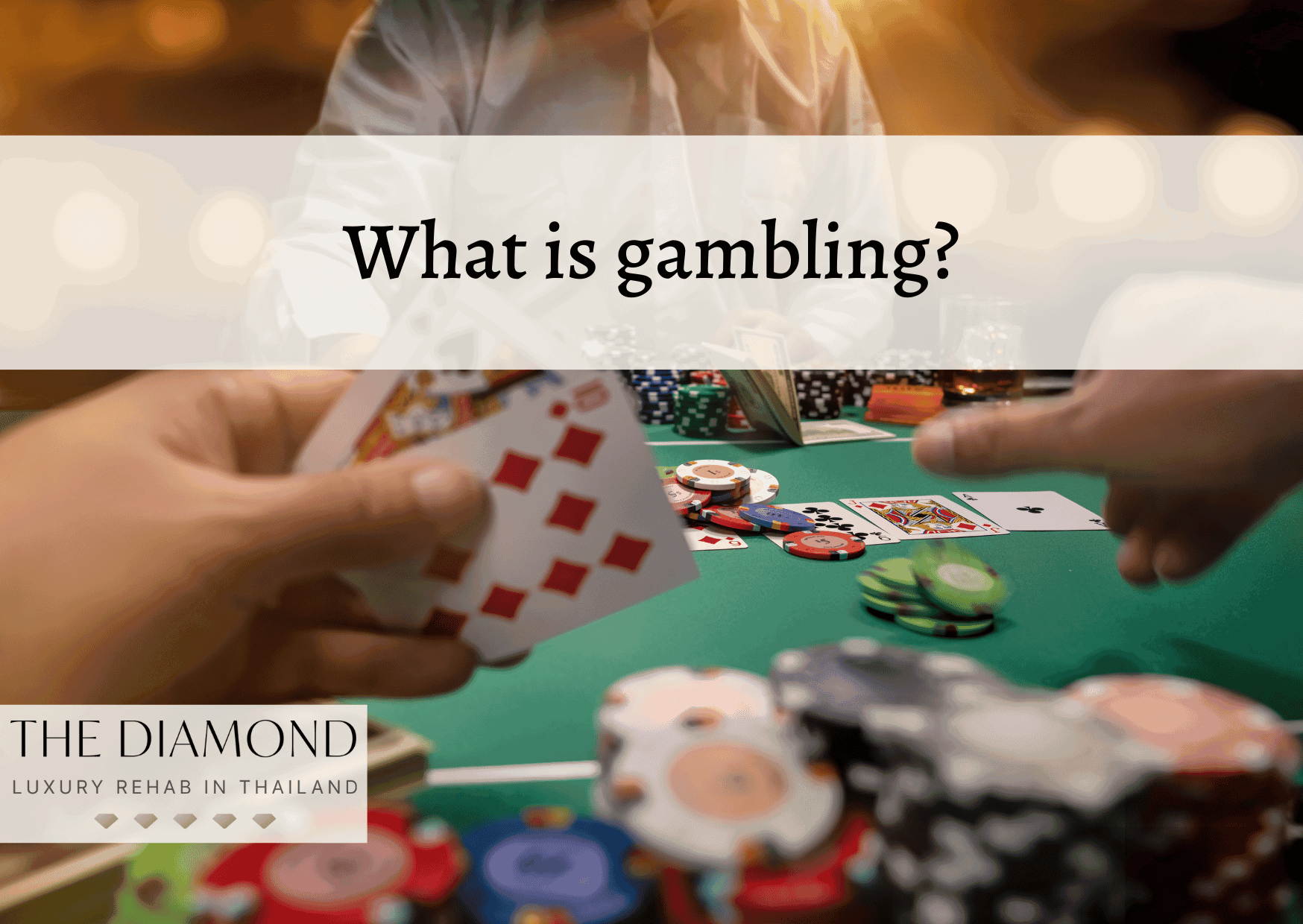
What is gambling?
Gambling is any activity that involves risking money or another object of value as the result of something. A gambler wagers the stakes (money or object of value) on events with uncertain outcomes hoping to win. Gambling takes many forms, but we can divide them into chance-based and skill-based.
Examples of chance-based gambling include lottery, bingo, roulette, and gaming machines. All players have equal chances of winning, but they can’t control the outcomes.
Skill-based gambling includes blackjack and other card games, betting on horse races, and other similar activities. Here, a person’s skills determine whether they win or lose the bet.
Just like there are different types of gambling, not all gamblers are the same. Three categories of gamblers include professional gamblers, social gamblers, and problem gamblers. However, it’s not uncommon for problem gamblers to believe (and try to convince others) that they are social or professional gamblers. That happens because they believe they know what they’re doing.
Problem gambling is a repetitive gambling behavior despite negative consequences. Also known as gambling addiction, it’s an uncontrollable urge to keep gambling.
Why should we avoid gambling?
We should avoid gambling because it causes serious problems with finances, relationships, work, and other aspects of life. Gambling causes legal problems and contributes to mental health conditions such as depression and anxiety. The most severe consequences of gambling include addiction and suicide attempts due to all problems that addiction has caused.People need to avoid gambling because they don’t realize how addictive it is. Even though it’s easy to think one or several trips to the casino or betting place won’t do harm, the reality is different. Gambling gets a person hooked, even when they keep losing.
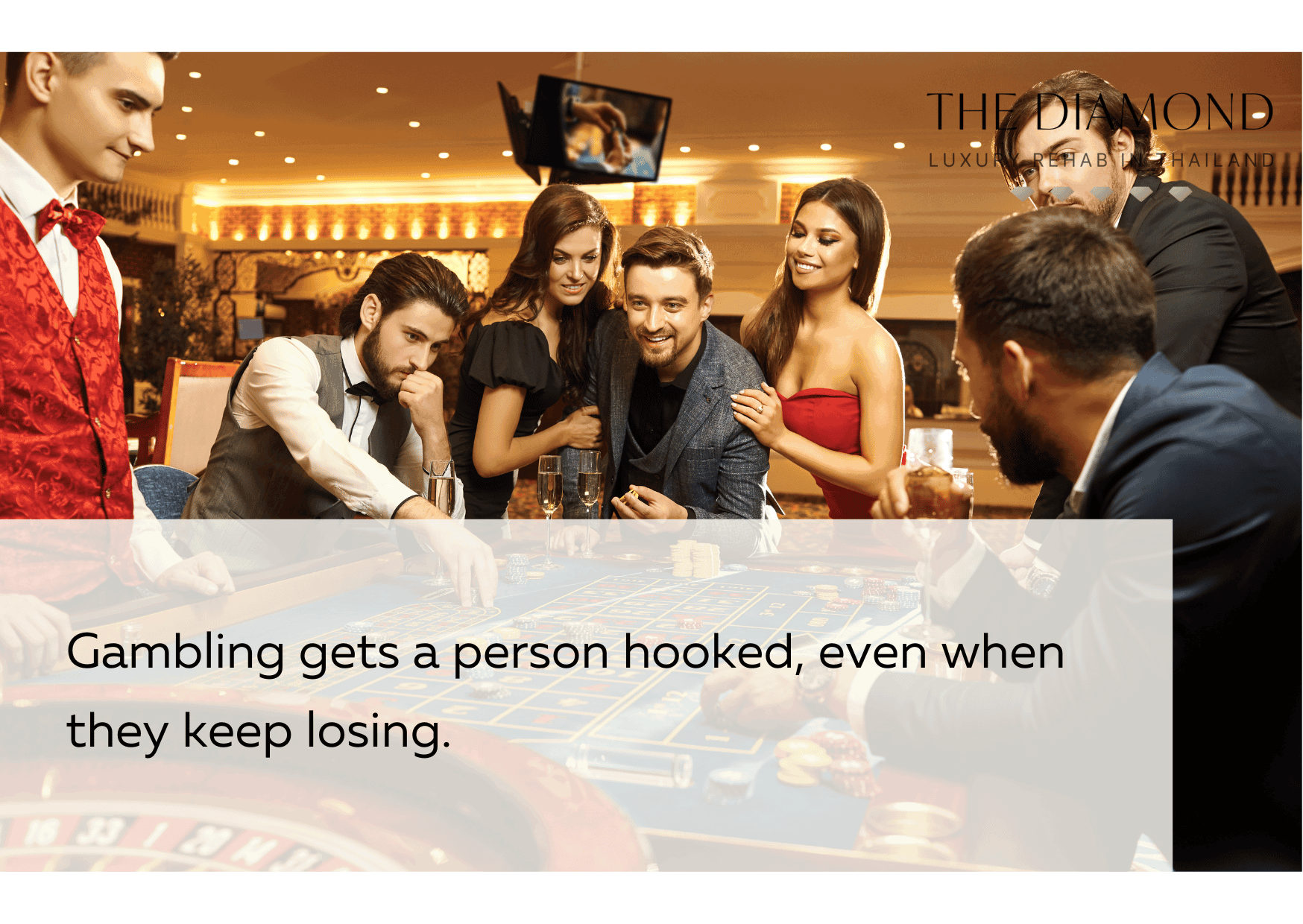
How to spot an addicted gambler?
Spotting an addicted gambler involves recognizing specific behavioral and psychological signs that indicate an individual is struggling with gambling addiction. The ways on how to spot an addicted gambler by the characteristics are listed below.
- Spending an increased amount of time gambling
- Spending more and more money on gambling
- Using gamble as an escape from stress
- Constantly reading about gambling, hoping to do better
- The strong belief in being in control of their gambling sessions
- Assuming they’re a professional
- Difficulty in cutting back, even when losing
Evidence shows compulsive, or problem gamblers tend to be disorganized, poorly adapted, emotionally unstable, impulsive, and suffering from alcohol problems. The characteristics of addicted gamblers are more pronounced if they have a co-occurring mental health disorder.
For example, a 2010 study titled, “Subtyping Study of a Pathological Gamblers Sample” from the Canadian Journal of Psychiatry discovered four separate clusters of pathological gamblers. Type I, dubbed disorganized and emotionally unstable, was characterized by major psychopathological problems, high impulsiveness, substance and alcohol abuse, early onset, and schizotypic features.
Schizoid type II showed high levels of social alienation, alcoholism, and pain avoidance. Reward sensitive type III displayed high levels of sensation seeking and impulsivity, but no appreciable psychopathological deficits.
Last but not least, type IV, often known as high-functioning, had a globally adaptive personality profile, no psychopathological disorders, and minimal levels of substance and alcohol addiction or smoking.
What are the symptoms of gambling addiction?
Symptoms of gambling addiction include strong cravings for gambling. Also, they involve constant planning of gambling activities or spending a lot of time thinking about gambling or moves to make the next tie. Chasing losses is also a hallmark symptom of gambling addiction. Using the same amount of money all the time isn’t thrilling in the long run, which is why a compulsive gambler keeps increasing the amount of money. They do so to experience the same thrill or satisfaction.
Additionally, symptoms of gambling addiction include anxiety, restlessness, frustration, and mood swings when a person is unable to gamble at a specific moment.
For many people with gambling addiction, gambling serves as a way to escape problems in life or deal with stressful situations and other negative stimuli. Like people with other types of addiction, compulsive gamblers refuse to acknowledge the existence of a problem and lie to their family and friends about the extent of gambling.
Gambling addiction also includes problems with relationships, work or school, finances, and legal troubles. Many of them end up in debt or bankruptcy.
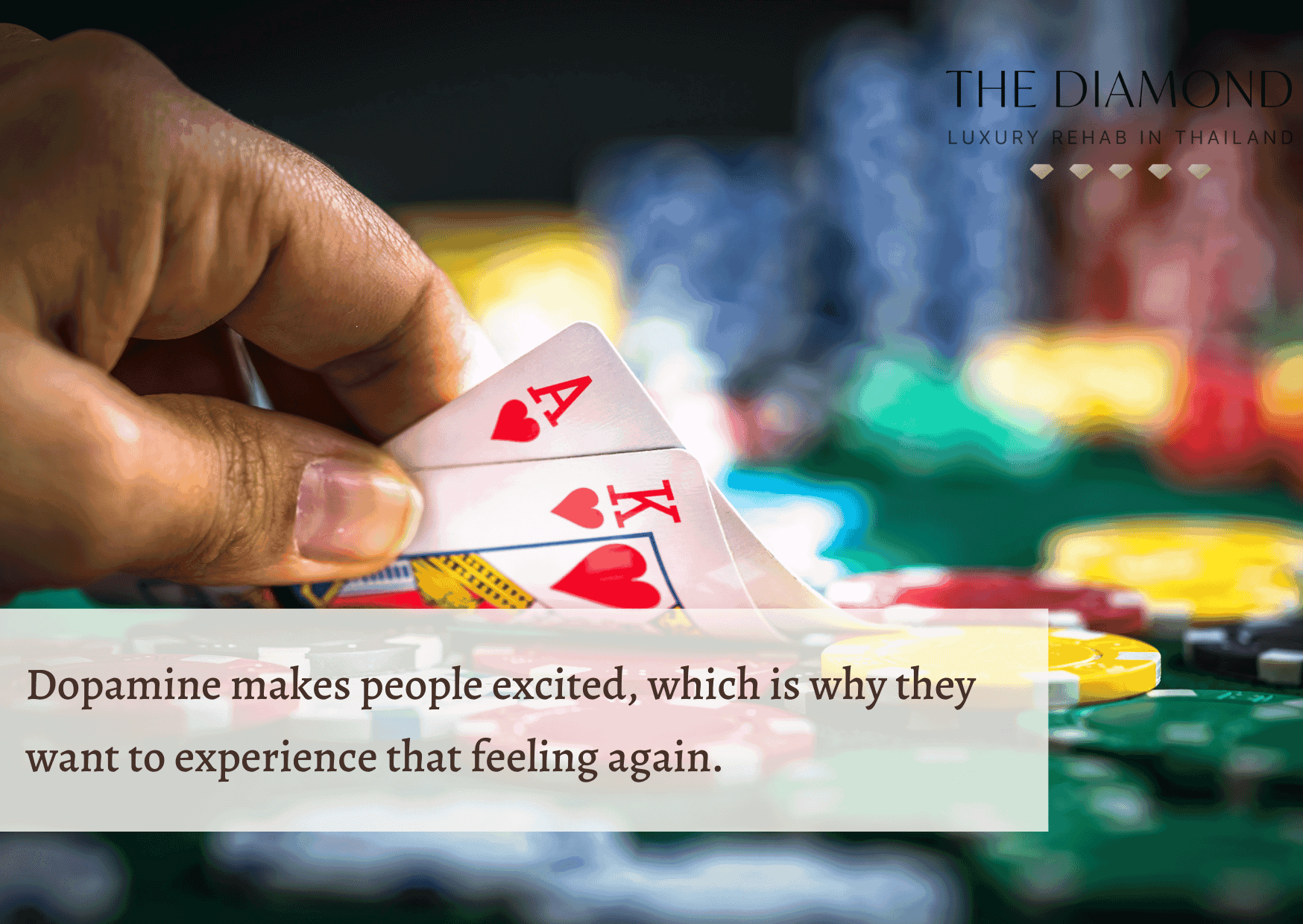
Why do people become addicted to gambling?
People become addicted to gambling because gambling causes the release of dopamine, the feel-good neurotransmitter that regulates the brain’s reward system. Dopamine makes people excited, which is why they want to experience that feeling again. Interestingly, gambling triggers dopamine release even when a person loses.
Continued exposure to gambling weakens the dopamine receptors meaning a person needs to gamble more to experience the same thrill.
It’s important to mention that biological, genetic, and environmental factors are involved in the development of compulsive gambling causes and symptoms.
What are the risks of gambling addiction?
Risks of gambling addiction include relationship problems, financial problems such as bankruptcy, and legal problems including imprisonment.
Also, negative effects of gambling addiction include poor general health and worsening mental health.
People who live with this addiction tend to suffer from migraines, depression, high blood pressure, intestinal disorders, and even cardiovascular problems such as angina and tachycardia.
How does gambling addiction affect the addict’s family?
Gambling addiction affects the addict’s family because it breaks trust between people. A person with gambling addiction refuses to admit they have a problem and even lies about the extent of their gambling activities. At the same time, they may even use a spouse’s or family member’s credit cards, take money from their wallets, or sell their items of value just to get more money to spend on gambling.
Living under these circumstances can become stressful. This is especially the case when a person with gambling addiction reacts in anger when other people share their concerns. They tend to become argumentative.
Gambling affects family dynamics and creates an unhealthy environment where family members feel like they can’t trust this person or that they’re bringing them down. That happens because gambling causes financial problems; a person with this addiction may often rely on others to bail them out.
At that point, family members are fed up with lies and deceitful behavior and have no confidence in repairing the relationship. However, it’s important to keep in mind a person with gambling addiction needs a strong support system to overcome their problem and learn how to stop gambling.

